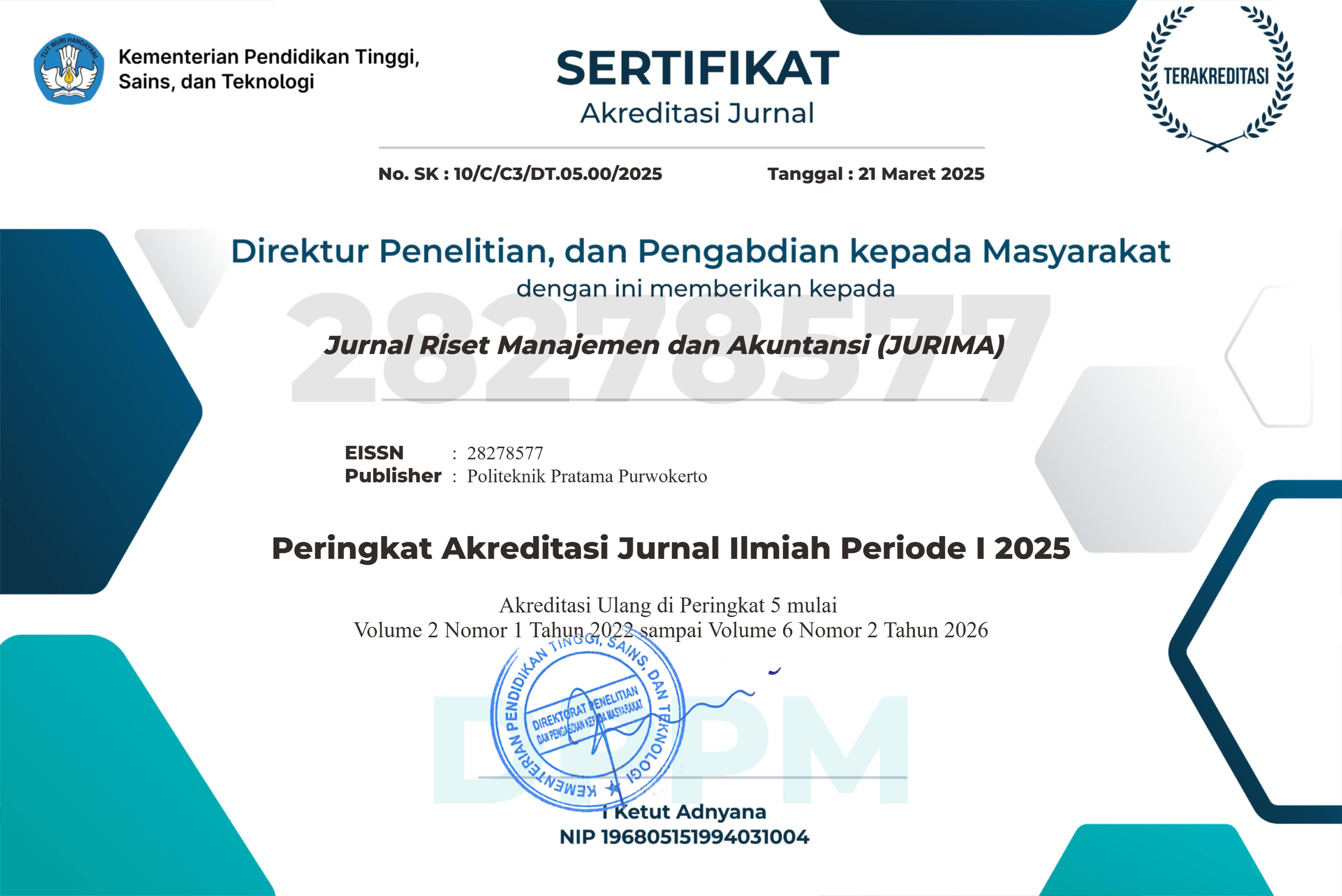PT Bank Negara Indonesia Tbk Menangkan ASRRAT 2024 Melalui Akuntansi Keberlanjutan yang Mendorong Transformasi Hijau
DOI:
https://doi.org/10.55606/jurima.v5i1.5055Keywords:
Sustainability Accounting, CSV, ESGAbstract
This study explores the implementation of sustainability accounting at PT Bank Negara Indonesia (Persero) Tbk (BNI) as a strategic tool to support green transformation and the realization of sustainable development. Through a qualitative case study approach, the research analyzes how BNI integrates Creating Shared Value (CSV), Social Return on Investment (SROI), and Environmental, Social, and Governance (ESG) principles into its business strategy to generate simultaneous economic, social, and environmental value. The results show that BNI’s sustainability accounting is not merely a reporting obligation but serves as a core mechanism in evaluating and directing business practices toward long-term sustainable goals. BNI has successfully implemented various sustainability initiatives, such as green financing, empowerment of micro, small, and medium enterprises (MSMEs), climate risk stress tests, and digital financial inclusion programs, all of which demonstrate measurable contributions to the Sustainable Development Goals (SDGs). The bank’s achievement in obtaining the Gold Rank at the Asia Sustainability Reporting Rating (ASRRAT) 2024 affirms the effectiveness of its sustainability strategy. This research highlights the importance of embedding sustainability accounting within the company’s governance and operational structure and recommends that future studies expand to cross-sectoral comparisons for broader generalization. Furthermore, this study provides practical insights for companies aiming to adopt sustainability accounting as an instrument of strategic transformation rather than administrative compliance.
Downloads
References
ASRRAT. (2024). Asia Sustainability Reporting Rating (ASRRAT) 2024 Highlights. https://www.ncsr-id.org/asrrat
BNI. (2024). Laporan Keberlanjutan PT Bank Negara Indonesia (Persero) Tbk 2024. https://www.bni.co.id/id-id/tentangkami/keberlanjutan/laporankeberlanjutan
Carroll, A. B., & Shabana, K. M. (2010). The business case for corporate social responsibility: A review of concepts, research and practice. International Journal of Management Reviews, 12(1), 85–105. https://doi.org/10.1111/j.1468-2370.2009.00275.x
Dyllick, T., & Muff, K. (2016). Clarifying the meaning of sustainable business: Introducing a typology from business-as-usual to true business sustainability. Organization & Environment, 29(2), 156–174. https://doi.org/10.1177/1086026615575176
Global Reporting Initiative (GRI). (2021). GRI Standards. https://www.globalreporting.org/standards/
Hermawan, M., & Mulyani, S. (2019). Pengaruh kualitas laporan keberlanjutan terhadap kinerja keberlanjutan perusahaan. Jurnal Akuntansi Multiparadigma, 10(1), 1–17. https://doi.org/10.18202/jamal.2019.04.1001
OJK. (2017). POJK No. 51/POJK.03/2017 tentang Penerapan Keuangan Berkelanjutan. https://www.ojk.go.id/id/regulasi/Default.aspx
Otoritas Jasa Keuangan. (2021). SEOJK No. 16/SEOJK.04/2021 tentang Bentuk dan Isi Laporan Keberlanjutan. https://www.ojk.go.id/id/kanal/sdg/Pages/Regulasi.aspx
Porter, M. E., & Kramer, M. R. (2011). Creating shared value. Harvard Business Review, 89(1/2), 62–77. https://hbr.org/2011/01/the-big-idea-creating-shared-value
SASB. (2021). Sustainability Accounting Standards Board Standards. https://www.sasb.org/standards/
Schaltegger, S., & Burritt, R. (2018). Business cases and corporate engagement with sustainability: Differentiating ethical motivations. Journal of Business Ethics, 147, 241–259. https://doi.org/10.1007/s10551-015-2938-0
Tilt, C. A. (2018). Making social and environmental accounting research relevant in developing countries. Pacific Accounting Review, 30(3), 323–328. https://doi.org/10.1108/PAR-05-2018-0036
UNEP Finance Initiative. (2020). Rethinking impact to finance the SDGs. https://www.unepfi.org/publications/rethinking-impact-to-finance-the-sdgs/
World Bank. (2020). Transforming financial systems for climate. https://www.worldbank.org/en/topic/climatefinance
Yuliana, D., & Raharjo, T. S. (2020). Praktik pelaporan keberlanjutan: Antara kepatuhan dan substansi. Jurnal Akuntansi Indonesia, 9(2), 77–91. https://doi.org/10.21070/jai.v9i2.1234
Downloads
Published
How to Cite
Issue
Section
License
Copyright (c) 2025 Jurnal Riset Manajemen dan Akuntansi

This work is licensed under a Creative Commons Attribution-ShareAlike 4.0 International License.










